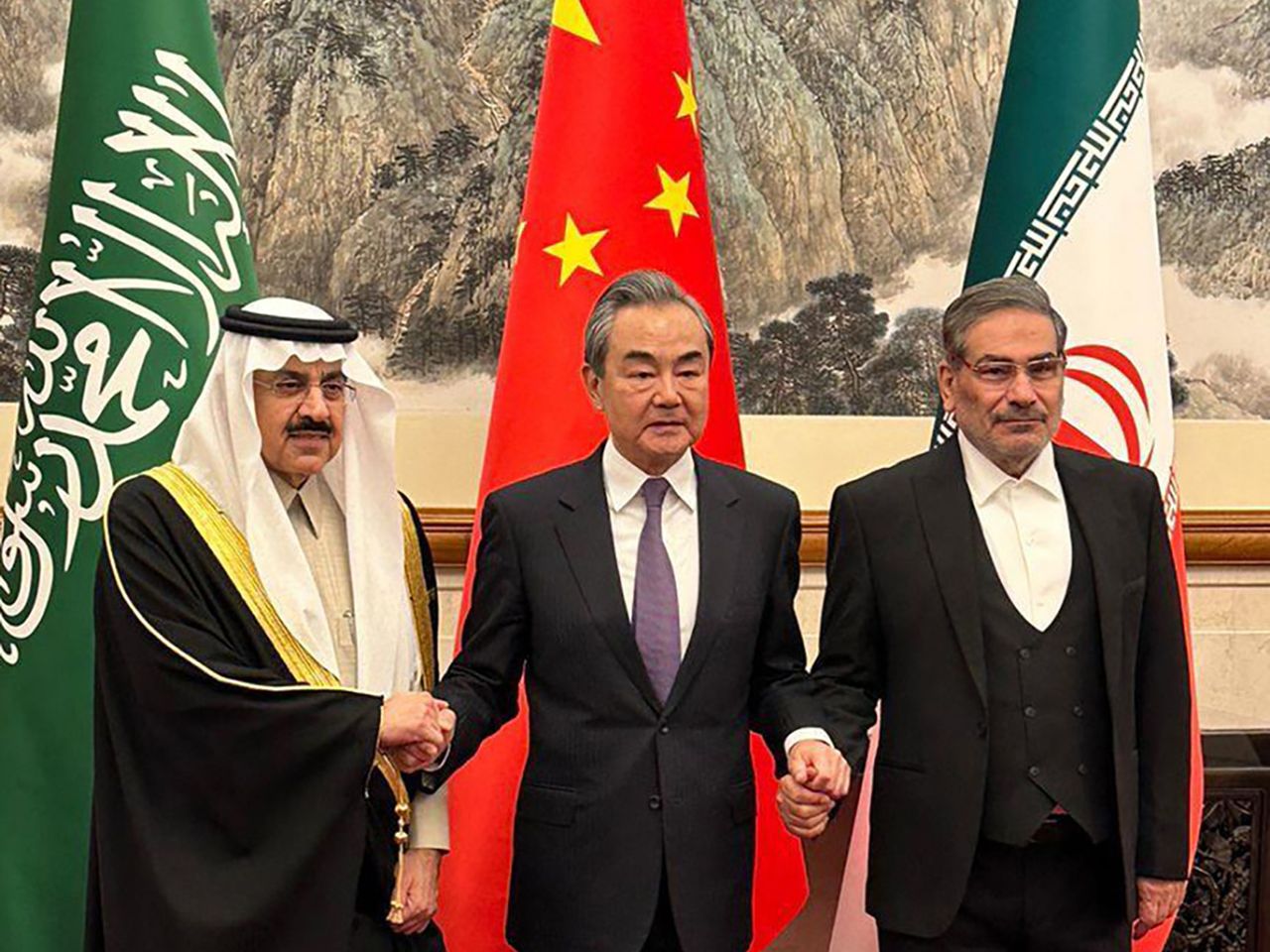By: Alishba khan

The relationship between Iran and Saudi Arabia has been strained for decades, driven by sectarian differences, geopolitical competition, and conflicting regional interests. The two countries have supported opposite factions in conflicts across the Middle East, including Syria, Iraq, Yemen, and Lebanon, which led to significant bloodshed and instability. Saudi Arabia has also blamed Iran for supporting terrorist groups and fermenting regional instability. However, recent developments inferred a possible change in the stance of Saudi Arabia towards Iran. Despite this enmity, there have been recent signs of rapprochement between both countries, as the secret talks initiated in 2021 between Saudi Arabia and Iran to reduce tensions in the region and improve relations.
Saudi Arabia’s economy mainly depends on oil exports, and the recent decline in oil prices has hit the kingdom hard. On the other hand, Iran has a lot of natural gas reserves and is also thinking of increasing its oil exports after lifting its sanctions.
The talks reportedly focused on various issues, including regional security, economic cooperation, and the normalization of diplomatic ties. After years of backchannel diplomacy, the two regional heavyweights, Iran and Saudi Arabia, decided to bury the hatchet of animosity, rivalry, and conflicts. They announced restoring the diplomatic ties and opening their embassies within two months. The deal implies that the two of the greatest regional rivals have made certain advancements in addressing the critical areas of dispute. However, the sudden change in the kingdom’s attitude and interest in a deal with Iran raises questions and requires an examination of the strategic calculus behind the kingdom’s foreign policy.
One possible reason Saudi Arabia is interested in a deal is to reduce regional tensions and stabilize the Middle East. The kingdom has been hit hard by years of conflict and instability in the neighboring countries, and a deal with Iran might lead to a reduction in proxy wars and conflicts in the region as Saudi Arabia has long preconditioned to restore diplomatic ties that Iran would take de-escalator steps in Yemen such as stopping cross-border attacks on the kingdom. This will benefit both KSA and the global economy, as a large part of the world relies on oil from the middle east. The attacks carried out in 2019 and 2020 on Emirati, and Saudi Arabia’s infrastructure and oil tankers which Saudi Arabia blamed on Iran, destroyed the oil facilities of Saudi Arabia, causing problems for world energy security.
Another factor Is the changing geopolitical landscape in the region. The US, a long-standing ally of KSA, has been shifting its focus towards Asia to counter China’s rising influence and reduce its presence In the Middle East. In the past few years, the crown prince of Saudi Arabia labeled Iran’s supreme leader as Hitler. He was ready to wage war on Iran as long as the US would guarantee the defense of KSA under its security umbrella. But after the incident at Abqaiq oil facilities, Saudi Arabia realized it was on its own as the US did not retaliate on KSA’s behalf. This painful realization helped spur negotiations between Iran and Saudi Arabia as peace became a more attractive option. Thus, the Saudis realized that rather than buying an expensive US defense system, it was wise to use the influence of Russia and China over Iran to help strengthen its security. This has left Saudi Arabia feeling increasingly isolated and vulnerable, with Iran emerging as a potentially influential player. A deal with Iran can help Saudi Arabia reposition itself and counterbalance its growing influence.
There are also economic considerations at play. Saudi Arabia’s economy mainly depends on oil exports, and the recent decline in oil prices has hit the kingdom hard. On the other hand, Iran has a lot of natural gas reserves and is also thinking of increasing its oil exports after lifting its sanctions. A deal with Iran might provide Saudi Arabia with new markets and can diversify its economy away from oil. Improved relations with Iran can create new opportunities for economic cooperation for kingdoms like trade and investment and joint projects in areas like energy, transportation, and infrastructure.
From a security perspective, Saudi Arabia has long seen Iran as a major threat to its stability and security. Iran hinted long ago that it would hit the gulf monarchies due to any US and Israel attempts to destroy the Iranian nuclear facilities. Saudi Arabia is trying to avert this outcome by improving its diplomatic ties. The deal between Iran and KSA is a positive step that can enhance the security and stability in the region, as the channels of communication between both states will have positive implications in the matters like Syria, Yemen, and Palestine and will indeed mitigate the chances of direct military escalation between both states ensuring regional peace. It will put Saudi Arabia out of the firing line if any escalation happens between Iran, Israel, and the US due to the US and Israel’s ambitions to destroy Iran’s nuclear facilities.
Thus, this deal seems to be a step for Saudi Arabia to stay out of the fray if any conflict spurs as the chances of revival of JCPOA are close to death and there is a widespread chance of armed conflict between the regional rivals, i.e., Israel and Iran. Saudi Arabia sees the opportunity to focus on its journey of economic reforms, protect its border, invest in climate, and on its vision 2030 rather than going on the same path of tension and conflict with Iran.
So, Saudi Arabia views this rapprochement as a hedging bet to ensure security rather than strategic realignment. However, the strategic calculus behind Saudi Arabia’s interest in a possible deal with Iran is complex and multifaceted. While reducing regional tensions and stabilizing the region are the primary considerations, so are the region’s economic factors and geopolitical landscape. But it remains to be seen whether this agreement will lead to a lasting peace between the two regional rivals and whether both sides will follow through on their commitments.
The writer is a graduate of International relations from Quaid-i-Azam University and worked as a researcher with the Arms Control and Disarmament Center at the Institute of Strategic Studies Islamabad. She can be reached at [email protected]
